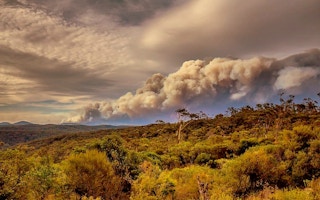Even as Australia reports that last year was its warmest and driest since records began, its government continues to avoid ramping up climate action, citing concerns over the ramifications that raising climate targets could have on the economy, and insisting the country should instead be rewarded for beating its emissions reduction targets for 2020.
To continue reading, subscribe to Eco‑Business.
There's something for everyone. We offer a range of subscription plans.
- Access our stories and receive our Insights Weekly newsletter with the free EB Member plan.
- Unlock unlimited access to our content and archive with EB Circle.
- Publish your content with EB Premium.
Ignoring the horrors of devastating bushfires ripping through forests and communities, Prime Minister Scott Morrison and his energy and emissions reduction minister, Angus Taylor, have said Australia does not need to cut carbon emissions, arguing that climate change and the fires are not directly linked.
In its Annual Climate Statement 2019 released yesterday, the Australian Bureau of Meteorology shows the nation’s mean temperature last year was 1.52 degrees Celsius above the long-term average, surpassing the previous record of 1.33 degrees Celsius set in 2013, while national average rainfall total was the lowest ever witnessed in the drought-prone country.
Fueled by searing heat and an intensifying drought, Australia’s fire season kicked off in September last year—three months earlier than usual. The flames, unprecedented in scale and the destruction wrought, have rampaged across the Australian states of New South Wales and Queensland, claiming 26 human lives and killing almost half a billion animals, with scientists worrying entire species could have been wiped out.
An area nearly 70 times the size of Singapore has been laid to waste, creating a plume of smoke wider than Europe. Dust and ash particles have been carried as far as New Zealand, painting the country’s glaciers brown. With dark surfaces absorbing more sunlight, this could speed up their thawing.
Dr Karl Braganza, head of climate monitoring at the Australian Bureau of Meteorology, said the record warm and dry year was among key factors in the devastating bushfires.
“2019 was consistently warm, but it was bookended by periods of extreme heat,” he observed, adding that while January last year had been the hottest month the nation ever recorded, December saw the Australia-wide record hottest daily average maximum temperature broken multiple days in a row.
“At the same time, rainfall deficiencies across large parts of eastern Australia have continued to increase, unfortunately exacerbating both drought conditions and the current bushfires,” he said.
Besides the two abnormal climate phenomena that occurred in 2019, the Bureau of Meteorology reported that a gradually warming climate was the main cause of Australia’s extreme weather patterns last year. “Very warm years like 2019 are now more likely to occur,” Braganza said.
Experts have argued Australia’s climate targets of cutting emissions by 26 per cent are not ambitious enough to limit global warming to the levels needed. But according to the United Nations, the country is not on track to even meet those nationally determined contributions under the Paris climate deal, along with about half of the G20 countries.
The Australian government has said ramping up climate ambitions will hurt the economy, particularly the country’s coal and gas exports.
The country is the world’s third-largest exporter of coal—the biggest contributor to man-made greenhouse gas emissions—and last year overtook Qatar as the top exporter of liquefied natural gas globally. Australia may only contribute 1.3 per cent of the world’s man-made carbon emissions, but it is the second-largest emitter per capita in the world, behind the United States.
“In most countries it isn’t acceptable to pursue emission reduction policies that add substantially to the cost of living, destroy jobs, reduce incomes and impede growth,” Angus Taylor, Australia’s Minister for Energy Emissions Reduction, wrote in The Australian newspaper on New Year’s Eve.
“That’s why we won’t adopt (opposition) Labor’s uncosted, reckless, economy-destroying targets that will always result in a tax on energy, whether it is called that or not,” Taylor continued, responding to criticism that Australia opposed more aggressive climate action at the recent United Nations climate summit in Madrid.
For much of Australia, there is little respite on the horizon from the ongoing wildfire crisis, with soaring temperatures and fierce winds forecast to worsen the situation this weekend and three months of summer still to come.










